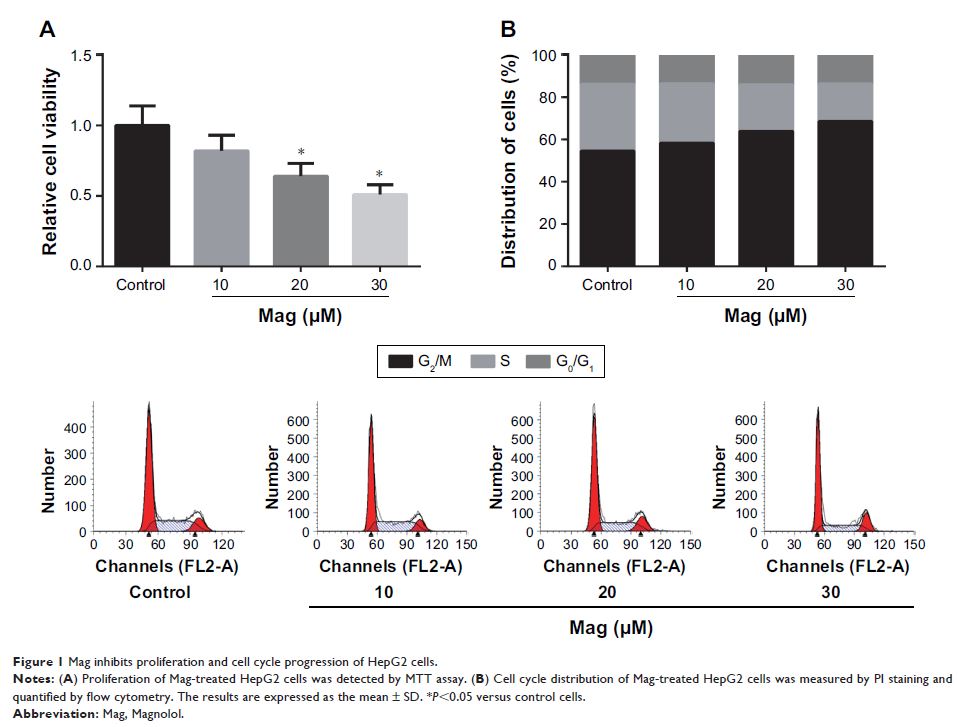108605
论文已发表
注册即可获取德孚的最新动态
IF 收录期刊
- 3.4 Breast Cancer (Dove Med Press)
- 3.2 Clin Epidemiol
- 2.6 Cancer Manag Res
- 2.9 Infect Drug Resist
- 3.7 Clin Interv Aging
- 5.1 Drug Des Dev Ther
- 3.1 Int J Chronic Obstr
- 6.6 Int J Nanomed
- 2.6 Int J Women's Health
- 2.9 Neuropsych Dis Treat
- 2.8 OncoTargets Ther
- 2.0 Patient Prefer Adher
- 2.2 Ther Clin Risk Manag
- 2.5 J Pain Res
- 3.0 Diabet Metab Synd Ob
- 3.2 Psychol Res Behav Ma
- 3.4 Nat Sci Sleep
- 1.8 Pharmgenomics Pers Med
- 2.0 Risk Manag Healthc Policy
- 4.1 J Inflamm Res
- 2.0 Int J Gen Med
- 3.4 J Hepatocell Carcinoma
- 3.0 J Asthma Allergy
- 2.2 Clin Cosmet Investig Dermatol
- 2.4 J Multidiscip Healthc

厚朴酚通过调节内质网应激介导的凋亡信号传导,在肝细胞癌细胞中发挥抗癌活性
Authors Wang YD, Sun XJ, Yang WJ, Li J, Yin JJ
Received 21 March 2018
Accepted for publication 10 May 2018
Published 28 August 2018 Volume 2018:11 Pages 5219—5226
DOI https://doi.org/10.2147/OTT.S168887
Checked for plagiarism Yes
Review by Single-blind
Peer reviewers approved by Dr Cristina Weinberg
Peer reviewer comments 2
Editor who approved publication: Dr Carlos E Vigil
Introduction: Magnolol (Mag), a biologically active compound isolated from the root and stem bark of Magnolia officinalis , has been reported to induce apoptosis in several cancer cell lines in vitro. In the present study, we aimed to determine the anticancer effects of Mag on hepatocellular carcinoma (HCC) cells.
Materials and methods: The HepG2 cells were treated with varying concentrations of Mag (10, 20, and 30 µM) for 48 hours. The effects of Mag on the proliferation, migration, invasion, apoptosis and cell cycle progression of HepG2 cells were respectively detected by MTT assay, transwell assays, and flow cytometric analysis. A HepG2 cell-based tumor-bearing model was established to evaluate the effect of Mag on HCC tumor growth in vivo. The protein expression levels were determined by Western blot analysis.
Results: Our results showed that Mag inhibited the proliferation, migration, and invasion of HepG2 cells in vitro in a dose-dependent manner. In addition, Mag reduced the HCC tumor volume and weight in the mouse xenograft model. Subsequent studies showed that Mag induced apoptosis in HepG2 cells, accompanied by a loss in mitochondrial membrane potential, cytochrome c release, and induction of endoplasmic reticulum stress. Furthermore, inhibition of the endoplasmic reticulum stress by CHOP knockdown restored the effects of Mag in HepG2 cells.
Conclusion: The present study highlighted the possibility of using Mag as a novel therapeutic drug for HCC treatment.
Keywords: hepatocellular carcinoma, magnolol, apoptosis, mitochondrial dysfunction, endoplasmic reticulum stress
